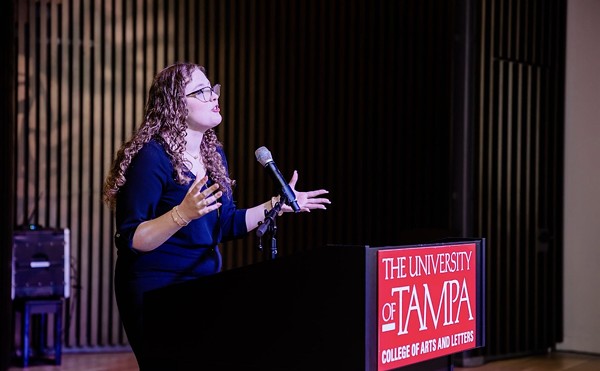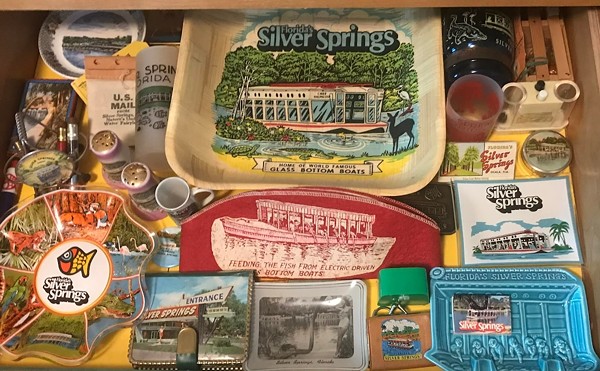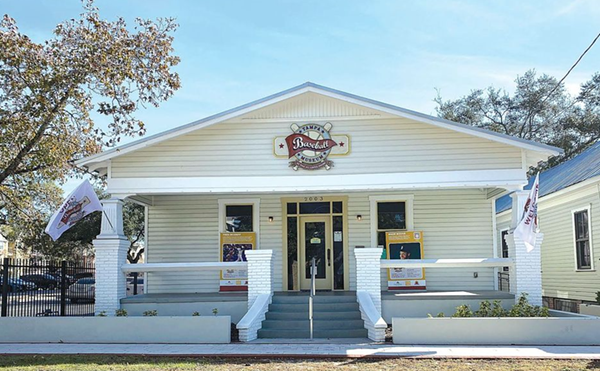The worst thing about Alissa Nutting’s debut novel is the hype: Most controversial novel of the year. Most perverted novel of the year. Reverse Lolita for the American Psycho set. Etc.
And surely some in our neck of the woods will be bothered by the title Tampa, a moniker wielded to symbolize, Sodom- and Gomorrah-like, the general classification for a depraved place, its inhabitants good-natured wallowers in the filth, where shallow self-gratification reigns supreme.
But in the end, I think it’s a pretty fine book. Surely not a top ten pick for any K-12 or Greater Tampa Chamber of Commerce Required Reading lists, but like the beauty that emerges from elaborate choreographies of violence and gore in the films of Takashi Miike or Tarantino, Tampa makes of its sexual caricature and excess a sublime carnal opera.
Tampa’s Celeste Price is modeled on Temple Terrace teacher Debra Lafave, who was found guilty of having sex with a 14-year-old student and who was too pretty for prison, according to her lawyer. Lafave and Nutting were fellow students at Bloomingdale High School in Valrico.
The novel begins with a masturbation scene on the eve of Celeste's first day in a new high school teaching job, and it’s pretty clear within a few pages that our hero is revolted by her studly cop husband (the sensation of his stubble on her lips when he kisses her is like a “forced enema”) even though they are “the ‘his’ and ‘hers’ winners of the genetic lottery”; she is sexually starved for 14-year-old boys; and every move she has ever made has been calculated to put her in this position, at the front of the classroom, to prey on a steady, never-ending herd of young boy meat.
Before the first class has assembled in her new classroom and in anticipation of a specific breed of tight-lipped but seducible young’un, Celeste has “performed a small act of voodoo, reaching up my dress to the clear inkpad between my legs, wetting my fingertip and writing their names upon the desks in the first row, hoping by some magic they’d be conjured directly to those seats, their hormones reading the invisible script their eyes couldn’t see.”
Even her pedagogy is in service of her desire. Her Nathaniel Hawthorne discussion questions are Socratically designed to bring horny young minds around to thoughts of banging their teacher.
Celeste is not the desperate sentimental lout that Humbert Humbert is. She is more cunning and calculating, a woman bent on servicing her own irresistible neuroses, someone slyly and chillingly inventive with her predations and cover-ups, who never justifies or rationalizes them.
The closest she comes to recrimination is this bit: “At times I wished that my genitals were prosthetic, something I could slip out of. They were a constant drone of stimulation; their requests hummed aloud throughout my life like a never-ending soundtrack. And everywhere I looked there were young male bodies.”
Circle “young” there. Celeste is also obsessed with exotic facials utilizing oxygen and caviar and enzymes, and she takes “precautionary Botox” and microdermabrasion and light therapy — all in the hopes of preserving her ability to attract those young male bodies, which goes hand in hand with preserving her own youth. Nutting writes that Celeste tried to literally envision herself getting younger during the treatments, picturing her “fourteen-year-old self standing off in the distance, waiting for me to come repossess her body.”
While the central affair doesn’t get going until 100 pages in, the plot moves along boldly and swiftly, but it’s tricky to comment much on its approach without spoiling the potential fun. Suffice to say that, while it broaches, Native Son-like, a courtroom theater that a lesser writer might exploit for expository commentary on the media and women in society, Nutting stays true to her character’s neuroses and even to her single-minded vapidity. Celeste is a despicable and tragic figure who can’t do a thing about the fact that she ruins every life she touches, including her own.
I had a few words with Nutting, who currently lives in Ohio and whose book of short stories, Unclean Jobs for Women and Girls, was selected by Ben Marcus as the winner of the 2006 Starcherone Prize for Innovative Fiction. We started with the title’s inherent Tampa diss.
Jeff Parker: Given that there’s not much on setting in the book, Tampa is an odd title. What’s the story there?
Alissa Nutting: This book is largely about society’s fetishization of female predatory sexual behavior, about engaging with the fantasy elements of it, poking and questioning them. This type of case could (and does) happen all over the country. But it’s happened in the Tampa area a few times in the past decade, and I feel like Tampa as a setting interacts with the troubling fantasy in a more productive way than, say, Cleveland, where I live now, might. When people fantasize about cases like these, I’m sure they’re more inclined to think of the teacher frolicking in a bikini on the beach than laying down a few inches of rock salt in the driveway wearing an oversized flannel and long johns.
JP: By page 26, I was thinking, “Can it get more lewd?” And it can. It can get more lewd… But (spoiler alert) the consummation scene doesn’t even happen until page 100. Were you at all worried that readers would be so spent by Celeste’s sexual antics that, when she finally fucks her student, it wouldn’t hit? Or did I get that backwards, and it was designed to desensitize us to it by the time it actually happens?
AN: I suppose it’s lewd. I guess I have a pretty high lewd-ity threshold. Well, I didn’t want the book to build up to her sleeping with a student and have the novel (ugh, sorry, this pun is jumping in front of me and I see no way around it) climax there. I wanted readers, by page 5, to be able to say very objectively, “This woman is full-stop bananas.” That’s what’s important, and what consequence she does or does not face for her actions is important. It was necessary for her character to actually commit the crime, but I didn’t want that scene to be the center of the novel.
JP: I know that you went to school with Debra Lafave, and your Celeste Price bears more than a few similarities. Did you know her? Why did you pick her as the model?
AN: I didn’t know her. Celeste bears more than a few similarities to many cases of female sexual predators that make national news, but she also bears more than a few differences to them. I didn’t want to write a fictional biography of any actual individual. That didn’t interest me. I’m fascinated by the way these types of cases are received and viewed in our society. Part of that view, in my belief, is that people look at these young women, who are usually (if it made national news) attractive, and they think, “She doesn’t look like a criminal. She doesn’t deserve to go to prison.”
JP: That must have been strange, to watch that whole LaFave spectacle play out knowing that you’d been in Valrico (of all places) together. What did you think about it at the time? Did you watch it then through a political lens or was it more personal? I’m assuming the seed for the novel started to grow then?
AN: That’s when I first started paying attention to cases like this, and to the way that this “phenomenon,” if you want to call it that, has really captured our nation’s attention in a profound way. At the time I mainly just couldn’t get over my own disbelief, but I was also aware of an odd willingness on my part to look for reasons why it might not be her fault, why she couldn’t be held responsible for doing such a thing. That was something I questioned and wrestled with and found myself wanting to think about more and more as I began to pay attention to other cases of female teachers doing this with underage male students. What social factors had trained my mind to want to let them off the hook when intellectually I knew they should go to prison?
JP: I hope you don’t mind me quoting the inscription from the copy of the book you gave to your parents (stolen from your Facebook photo!): “For my parents, whom I dearly love. DO NOT READ THIS IT WILL ONLY CAUSE YOU TRAUMA!!! I AM SERIOUS. NOT A WORD.” Did it work?
AN: It definitely worked. They didn’t read it. My parents know me well enough to understand that is not an empty warning. My mother-in-law also isn’t reading it. “So you’ll never have to worry if I’ll think differently of you because of it,” she said to me. I thought that was very sweet of her.
Jeff Parker, the founding Director of the University of Tampa Low-Residency MFA in Creative Writing program, is the author of the novel Ovenman.


















